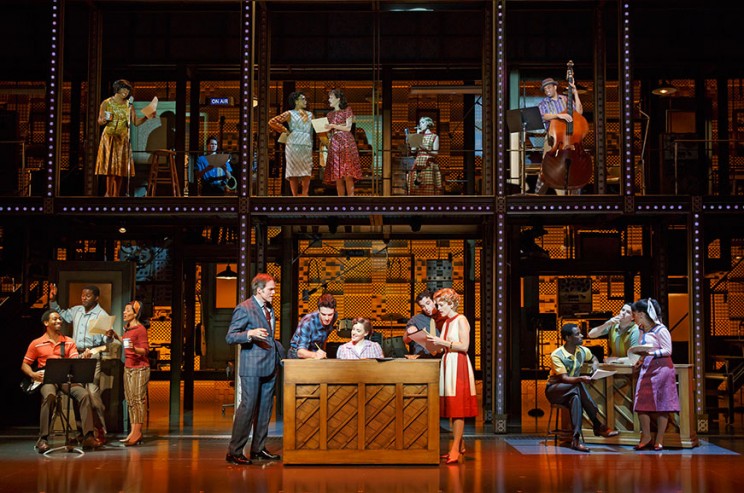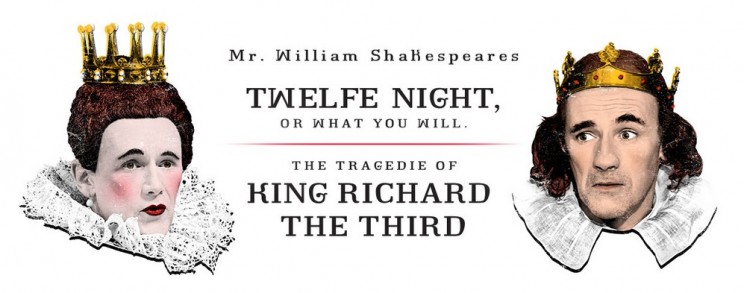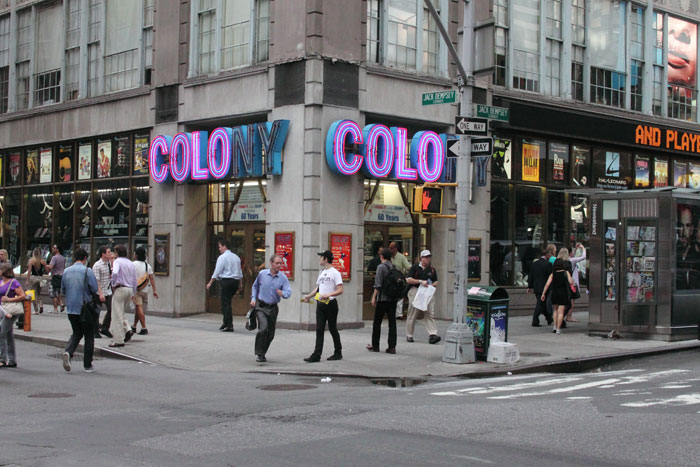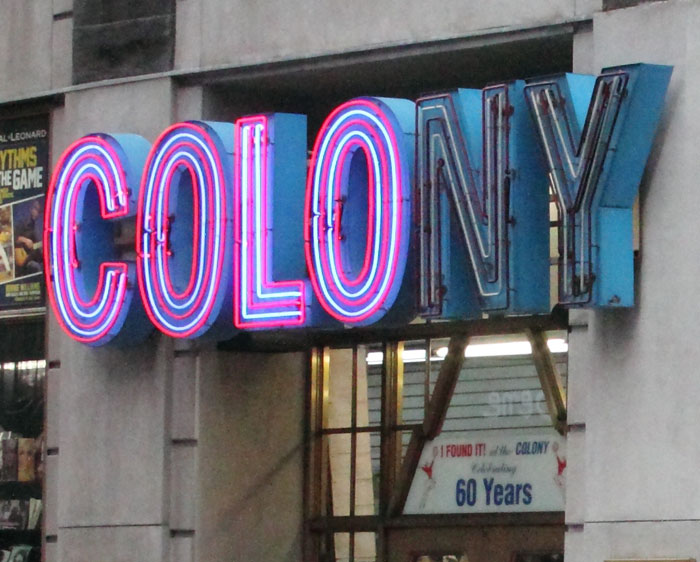By Liz Wollman
Awards season bring out everyone’s inner analyst. The moment that nominations are announced, everyone starts trying to figure out what the list of nominees says about the state of whatever medium is being lauded. During the Grammy, Emmy, Academy, and Tony Awards seasons, critics use the nominees to analyze the state of the art, fans align themselves in solidarity behind performers both honored and snubbed, and everyone rushes to hear or see whatever they have missed.
Then, during the awards shows, journalists, bloggers, scholars and fans take to their couches, and break the Internet with rapid-fire opinions about every damn thing on the screen. The next morning, talk centers on who wore what and who said what and who deserved what. People dish in the office and on the phone and on the web. And then, by midweek, no one cares anymore and we’ve all moved on.
While the Tonys (airing this year on Sunday, 8 June at 8 p.m. on CBS) are never watched by as many people as are the Academy Awards, the Emmys, or the Grammys (or even the Country Music Awards, which attracted nearly double the audience of the Tonys in 2013), the same rules apply. This year, Tony talk is particularly fevered because the nominations seem so random. Since late April, journalists, bloggers, and — ahem — scholars have weighed in on what this strange roster says about the sanity of the nominating committee, the implications of the current season for the future of the industry, and, of course, what it means for the State of Commercial Theater in New York.
I’ve seen many of the shows that were nominated this year, along with quite a few that were not, and I can assert — with scholarly authority — that I have absolutely no idea who is going to win anything, or what this year’s nominations say about the State of Commercial Theater in New York or, indeed, on Earth. Don’t believe anyone who claims they do.
Some background: Last year, many nominations went to a relative handful of commercially and critically successful shows like Matilda, Kinky Boots, and Pippin. This year’s list features no clear frontrunners and does not cluster around a handful of top-grossing productions or clear standout performances.
Maybe that is because this year has been comparatively disappointing, at least as far as monster-hit musicals go. The most anticipated spectacles — Rocky, If/Then, and The Bridges of Madison County — failed to connect solidly with critics or audiences. (To be fair, Rocky seems to have connected with people who enjoy watching half-naked guys belt out tunes while punching meat and other half-naked guys. I suppose that counts for something?) As a result, nominations in the Best Musical category went to shows that were reasonably well-received—like Beautiful and A Gentleman’s Guide to Love and Murder—if not critically or commercially ecstatic or particularly aesthetically groundbreaking.

The cast of Beautiful: The Carole King Musical, nominated for Best Musical, photo by Joan Marcus, via BeautifulonBroadway.com
As for plays, while one was completely shut out (Will Eno’s The Realistic Joneses), most have gotten at least a few nods, if not for best play or revival, then for actress, actor, or supporting roles. The biggest surprise to some is the clutch of nominations that went to the Shakespeare’s Globe all-male Twelfth Night, a big hit this past fall. This is particularly big news to people who presume that (a) Broadway audiences are morons, (b) Tony voters are morons, or (c) Shakespeare was a moron.
The other big surprise was the omission of Denzel Washington and Daniel Radcliffe from the Best Leading Actor in a Play category. This might have more to do with the large number of prominent male roles on offer this year than anything else, though New York Times theater critic Ben Brantley gamely suggested recently that Radcliffe and Washington were passed over because they are so very, very good in their roles. Sure, Ben, whatever.
Here’s the thing: While I am sure Radcliffe and Washington were irked by the oversight — along with the producers of If/Then and Rocky and Bridges of Madison County and the rest of the snubbed — the Tonys don’t matter. At least not in the way that people seem to want them to matter.
The awards themselves say nothing, in the long run, about the State of Commercial Theater in New York or, indeed, on Earth. The awards ceremony is meaningful. The actual winning and losing? Not so much. What makes any awards ceremony important is the care and love people put into it. For better or worse, we Americans are world-famous for our commercial entertainment, and in honoring it, we celebrate ourselves.
Tonys are particularly sweet because they give us a break from endless laments about how the theater is dead or dying, too expensive, too inaccessible. For a few weeks in the late spring, we get to celebrate the very fact that Broadway continues to matter at all, regardless of what kind of season it’s been or who walks away with laurels.
So instead of offering a list of predictions, I will tell you what I am hoping to see and celebrate during the festivities on 8 June 2014:
(1) Audra McDonald
The ludicrously talented McDonald could become the first performer to win six Tonys for acting. Also, since Lady Day at Emerson’s Bar and Grill is being considered as a play and not a musical, McDonald could also become the first person to win a Tony in each of the four acting categories (she’s won in the past for Best Actress in a Musical, Best Featured Actress in a Musical, and Best Featured Actress in a Play). This would be great to see, it’s certainly well deserved, and as an added extra, I bet some lucky contractor will be hired to expand her mantelpiece, yet another way that commercial theater boosting the city’s economy! When Audra wins, everybody wins. And if she doesn’t win this year, you can bet she’ll still perform during the broadcast and be typically thrilling, so no one will suffer overmuch one way or the other.
(2) Kelli O’Hara
Like McDonald, O’Hara has been astounding us for quite a while. I would pay to watch her knit a scarf. She even managed to convince me that The Bridges of Madison County — a loathsome novel made into an even more loathsome movie — actually has a right to exist. But unlike McDonald, O’Hara has yet to take home a Tony, which is absolutely unacceptable. O’Hara has been nominated for Best Actress in Musical five times. If she doesn’t win this time around, I can’t promise I won’t fly into an uncontrollable rage and take out my frustration on some poor, unsuspecting soul, probably Robert James Waller.
(3) Mark Rylance
Rylance is nominated for Best Actor (Richard III) and Best Actor in a Featured Role (Twelfth Night). Both times he won in the past, he recited verses by the Minnesota poet Louis Jenkins in lieu of a formal acceptance speech. The poems are irreverent and sweet and often hilarious, and so is Rylance. I hope we get to hear another. Again, though, if he doesn’t win this time, we’ll all survive.

Samuel Barnett (left) and Liam Brennan (right) appear in the Shakespeare’s Globe productions of Twelfth Night and Richard III, via Shakespeare Broadway.
(4) Actors Who Got the Shaft
Last year, Alan Cumming (Macbeth) and Scarlett Johansson (Cat on a Hot Tin Roof) weren’t nominated, but they showed up for the awards ceremony anyway; so did Bebe Neuwirth and Nathan Lane when they were passed over for their work in The Addams Family in 2010. They joked about their respective slights before graciously reading the nominations and handing out trophies. Their grace and aplomb remind us that theater is as often a collaborative art form that depends on trust and sharing as it is a vicious snake-pit of betrayal and recrimination. I hope that Denzel Washington, Daniel Radcliffe, Ian McKellan, and Patrick Stewart all get invited to hand out hardware, and agree to do so, setting aside any ego for the night. Bonus points if Captain Picard and Gandalf appear in their bowler hats, holding hands.
(5) Neil Patrick Harris and Hugh Jackman
If these two men took over the world and repopulated it entirely with their love-children, no one would mind. I hope they hold a fabulous throw-down, judged by the equally awesome and beloved Lin-Manuel Miranda.
In sum: this year’s scattershot nominations make predicting winners tough, but it doesn’t matter. What matters is that the Tony ceremony is going to be on the TV, and I’ll be watching (and snarking, and snacking, and tweeting) with a couple million other people. That strikes me as cause enough for celebration.
Liz Wollman is Assistant Professor of Music at Baruch College in New York City, and author of The Theater Will Rock: A History of the Rock Musical, from Hair to Hedwig and Hard Times: The Adult Musical in 1970s New York City.
Subscribe to the OUPblog via email or RSS.
Subscribe to only theatre and dance articles on the OUPblog via email or RSS.
Image credits: Poster for Twelfth Night and Richard III from Shakespeare Broadway. Photo of cast of Beautiful by Joan Marcus, via BeautifulonBroadway.com.
The post Why we watch the Tony Awards appeared first on OUPblog.

By Liz Wollman
Colony Records, which will close on Saturday, September 15th after 64 years of business, is no mere record store. A cavernous, crowded, and never particularly tidy place, Colony has kept one foot firmly in its Tin Pan Alley past, and the other in its media-saturated present. The largest and easily most famous provider of sheet music in New York City, Colony also houses cassettes, CDs, DVDs, karaoke recordings, an absolutely enormous collection of records, and all kinds of memorabilia: pop music action figures and Beatles mousepads; signed, fading photographs of A-, B-, and C-list celebrities from every decade that the store has been open; novelty key chains and promotional buttons from countless Broadway musicals; old concert programs, playbills, and t-shirts; Ramones coffee mugs and “Glee” lunchboxes; and locked shrines in dank corners, filled with dusty Frank Sinatra, Marilyn Monroe, and Elvis Presley collectibles. The staff, depending on whom you talk to, is comprised either of snobbish, standoffish jerks or brilliant, walking encyclopedias who can help you locate a piece of sheet music within seconds of your humming a few notes from the song in question, no matter how obscure. I suppose that genius and churlishness, just like Tin Pan Alley and rock and roll, are hardly mutually exclusive; the owners’ understanding of this is, in the end, likely why Colony managed to last as long as it did.

Photo by William Ruben Helms. Used with permission.
Colony Sporting Goods became Colony Records when its owners, Harold S. (“Nappy”) Grossbardt and Sidney Turk, took it over in 1948. Their sons, Michael Grossbardt and Richard Turk, are the current and will be the last owners. Initially located at 52nd Street and Broadway, Colony moved in 1970 to the Brill Building, at Broadway and 49th Street, where it has remained. On a typical day, visitors to the store include tourists from all over the world, members of the theater industry, professional and amateur musicians, and record and memorabilia collectors. Countless celebrities have patronized Colony in its six decades: Benny Goodman, Miles Davis, Frank Sinatra, John Lennon, Elton John, Neil Diamond, and Jimi Hendrix. The bizarrely image-conscious Michael Jackson used to make furtive visits via a back entrance, specifically to buy up enormous amounts of his own memorabilia. According to lore, both Bernadette Peters and Dusty Springfield decided to become entertainers after merely walking by the store and hearing music emanating from it. When James Brown visited, he apparently exclaimed, “This smells like a music store!”
He’s right; it does. And before paying my last visit to Colony this past week, I’d completely forgotten what a music store smells like. Also, what one looks like and feels like.
I am no stranger to Colony. I’ve bought plenty of sheet music from them in the 25 years that I’ve called myself a New Yorker. In that stretch of time, I have been, at various times and sometimes simultaneously, a reasonably good vocalist, a truly terrible pianist, a middling guitar player, and a music scholar who writes frequently about the post-1960 stage musical. I’m not an atypical patron, I think. In the weeks since news of Colony’s closing broke, I’ve heard plenty of people mention that they used to go there regularly when they dabbled in trumpet or in cello, or taught guitar or voice lessons, or before they decided to quit pursuing a career in the theater, or before Amazon started carrying everything they needed.
Yet despite how much it has served us New Yorkers — not to mention the millions of tourists who stroll, sometimes maddeningly slowly, through Times Square at some point during their visit here — I wasn’t terribly surprised by the news that Colony had fallen prey to declining sales, the Internet, and (the final straw) a landlord who plans to quintuple the rent of the store. None of this is shocking, especially when it comes to commercial real estate in Manhattan, which at this point heavily favors conglomerates. Really, the big news to me, at least initially, was not that Colony was closing. It is that Colony has managed to stay open for so very long.
Think about it: Colony opened in 1948. During the 1950s, rock and roll arrived, purportedly to destroy Tin Pan Alley in one fell swoop. During the 1960s, again purportedly, young people en masse abruptly turned their backs on the musical tastes of their elders. During these decades, Colony only grew in size — —so large, in fact, that its owners had to relocate. Its move, in 1970, coincided with one of the darkest periods in New York City’s history. Mired in financial crisis, and inching dangerously close to bankruptcy, New York was hardly a happy place in the 1970s. Times Square, Colony Records’ new home, had become internationally notorious — a sleazy, crime-ridden example of everything that had gone wrong with the urban jungle.
And yet Colony survived it all. It outlasted Beatlemania, psychedelia, disco, punk, hair metal, and hip-hop, MTV, VH1 and the first two decades of the Internet. It outlasted Napster and the dot-com boom. It outlasted Tower Records, HMV, Patelson’s, and Footlight Records. Arguably, it even outlasted, for a while at least, the neighborhood around it; Times Square was given a Disneyfied “facelift” in the early 1990s, which has resulted in a more tourist-friendly and seemingly safer, if also increasingly generic and corporate urban environment. Since it first opened in the postwar era, Colony has grown with and adapted to the times in ways that none of its past competitors managed. My initial reaction, then, was merely to praise Colony — not to mourn it for a second — because in the end, sixty years is a pretty impressive run for a family-owned business in the middle of Times Square.
But then I went to visit, and my logic gave way to a surprisingly emotional wave of nostalgia.
James Brown was right: it’s the smell of the place that gets you first — a mix of old, comfortably dusty things; of vinyl and paper and cool, musty formica. The sounds, too: a mix of Beatles songs blasted through the speaker, competing with several languages being spoken by as many tourists. “Look, honey, a Lady Gaga backpack!” a woman with a thick Long Island accent shouted down the aisle at her absolutely mortified pre-teen son. A man in a suit and sunglasses paced back and forth through the brass section while he talked shop on his phone. “We need to give them more bang for the buck this year,” he said. “Maybe we could get another few animals up on the stage this time around?” As “Strawberry Fields” came on over the speakers, I wandered through the aisle of picked-over cassette tapes, passed a group of Italian women looking at Beatles memorabilia, and found a huge basket of promotional pins from past Broadway musicals. I grabbed three, almost at random, from shows that all flopped at least a decade ago: Nick and Nora, Mayor, James Clavell’s Shogun: The Musical. The producers of those shows would have killed for even a fraction of the run that Colony has had.

Photo by William Ruben Helms. Used with permission.
I was about to leave, but then I started rifling through music books for the sake of rifling through music books. New ones, used ones, ones for woodwinds, piano, violin, voice, and guitar. They are, I am sure, all available online should I ever decide to become a terrible violinist or a horrible oboeist. But wandering through so much sheet music, being able to reach out and touch it, page through it, admire the quality of the paper is — much like spending an hour or two in a store flipping through records, or cassettes, or CDs — something I’d completely forgotten the pleasure of. I’ve spent a great deal of my life killing time in stores like these. I miss them, even as I understand that times change and modes of commerce with them. The automats are gone, too, from Times Square. So are the dime museums, the grindhouses, the arcades and the penny restaurants, and yes, the notorious if occasionally hilarious XXX theaters (a favorite marquis post from the early 1980s: “Hot As Hell! A Potent Groin Grabber!!”). I am sure that whatever chain store opens up in the place of Colony — be it a Gap, an Urban Outfitters, or a particularly snazzy Applebees — will, someday, also eventually close up shop.
I ended up purchasing the three pins, along with two used books of classic rock and pop songs “for very easy guitar,” which is about my speed these days. Warren, the longtime Colony employee who rang me up, gave me one of the pins for free, and then called my attention to the song that had come on over the speakers. “Man, this is the Beatles before they even sounded like the Beatles, you know?”
“Sure,” I replied, snapping out of my fog of nostalgia to focus on his. “Because it wasn’t their song, right? It was one of the songs they covered. It was originally by — by –”
“It’s ‘Matchbox,’” he said. “Carl Perkins. 1955? No. 1956.”
I chuckled. “Thanks.” I said, taking my bag and preparing to leave Colony for the last time, and realizing that my eyes were welling up. “For everything. I’ll miss you.”
He didn’t look surprised at all. “I know,” he said, gently. “We’ll miss you, too.”
Elizabeth L. Wollman is Assistant Professor of Music at Baruch College in New York City, and author of Hard Times: The Adult Musical in 1970s New York City and The Theater Will Rock: A History of the Rock Musical, from Hair to Hedwig. She also contributes to the Show Showdown blog.
Subscribe to the OUPblog via email or RSS.
Subscribe to only music articles on the OUPblog via email or RSS.
View more about this book on the 


Real Name: Charles John Huffam Dickens
Education: To pay for his board and to help his family,Dickens was forced to leave school and work ten hour days. He eventually went to the Wellington House Academy in North London.
Occupation: English writer, considered to be the greatest novelist of the Victorian period. Dickens is responsible for some of English literature's most iconic novels and characters.
First Book: A Dinner at Poplar Walk 1883 was published in the London periodical, Monthly Magazine.
0 Comments on Classic Author Charles Dickens as of 1/1/1900
 Borders & MarVista Entertainment partner (to launch an exclusive line of merch for new Disney Channel movie "16 Wishes." And Twilight's Ashley Greene is replacing Lauren Conrad as the face of the Avon brand Mark) (Cynopsis Kids) (WWD)
- In... Read the rest of this post
Borders & MarVista Entertainment partner (to launch an exclusive line of merch for new Disney Channel movie "16 Wishes." And Twilight's Ashley Greene is replacing Lauren Conrad as the face of the Avon brand Mark) (Cynopsis Kids) (WWD)
- In... Read the rest of this post

I just read two great blog posts today on how to provide excellence customer service.
The first is from David Lee King and it looks at how we can eyeball how our competitors (Netflix, bookstores, Google) do business and see either how we can do it better or how we enhance and expand the things we do best. Here are some points to muse on from his post - they are simple ideas but worth thinking hard about:
OK – so libraries have competition. What can you do about that? Here are some thoughts – please add more:
- What do you do better than everyone else? Focus on that. Prioritize that.
- You’re a natural community gathering place. Focus on your community. Feed it. Grow it.
- Ask people why they don’t use your library. Use that information to improve your services.
- Find your largest population segment of “potential patrons” and focus on growing patrons there.
- Don’t focus on yourself or your stuff – instead, turn your focus on your customers and their needs.
- Maybe it’s something as simple as rearranging your stuff so normal people can actually find things. We can do better than LC or Dewey call number order. Really.
- Work on improving the experience at your library – both in the library and
digitally.
And here is a stupendously wonderful post on interpreting customer body language - and, not coincidentally, offering terrific customer service. Although Elizabeth Bluemle is talking about bookstores, and specifically children's bookstores, everything she says can be transferred to a library setting. Here's a small tidbit of her post (but you really must read the whole thing):
Body language is huge when you're recommending books to customers. They will literally lean toward you and a book when they're interested, and lean away or step back when they're not. Kids are particularly funny about this: kids (especially ages 6-10) who don't know you, and who are not yet as schooled in politeness as most adults, may actually silently refuse to take hold of a book you're showing them if they aren't intrigued. When this happens, I either move on to the next recommendation or, if it's a great book I'm pretty sure the child will love, I reassure them that they don't have to commit to any book they take a look at, and that they might find it worthwhile to read a page or two of the proffered title. I also let them know that these are just suggestions, and that they certainly won't hurt my feelings if they decide not to get a book I've recommended. "You want the right book at the right time, a book you're in the mood for," I tell them, and—the pressure lifted—they usually are willing to take a look at whatever book with an iffy cover but terrific insides I'm trying to hand them.
The lovely thing about great customer service is that it doesn't need to cost money - it only requires a bit of thought, time, and attention. A perfect recipe for these hard times.
I confess I've never read Island of the Blue Dolphins by Scott O'Dell, but I did read
An Old-Fashioned Girl, by Louisa May Alcott and Understood Betsy, by Dorothy Canfield as a young'un.
Three Books...
by Lizzie Skurnick
Buck Up: Life Lessons From Young Heroines
This video segment on the huge demand for libraries is no surprise to any librarian:
Visit msnbc.com for Breaking News, World News, and News about the Economy
The City of Los Angeles announced that most city agencies would completely shut down on the second and fourth Friday of every month, starting July 10. Yes, that means every Los Angeles Public Library branch, as well as our Central Library, will be closed an additional two days a month.
LA City Parks and Recreation Centers will also be shut down on those days.
The LA Unified School District has cancelled summer school for all elementary and middle school children and for most high school children.
Meanwhile, families are struggling more than ever and don't have the money for vacations, summer camp, and movies - not to mention daycare.
We're going to have some busy, busy libraries this summer! Hopefully we'll convert some first-time visitors into life-long library customers - this is an amazing opportunity and not to be wasted.
But those second and fourth Fridays are going to be difficult indeed - for the people of LA who need their libraries and other city services, and for LA city employees who are all taking a 10% pay cut.
And I haven't even mentioned the impending layoffs...
The mood here is as gloomy as the weather, which has been unremittingly gray and cool.
But - LA Public Library has just hired a new City Librarian after more than a year without a leader at our helm! More on Martin Gomez in my next post.










Would be nice to have a couple of 'real' comments alongside those of Anonymous! :-) And if anyone knows how to remove the offerings of Anon, please would you do so?
Thanks,
Ros xx
. A post with an eventually positive message. Like those "warm, sunlit little places where life truly begins." A lovely thought about such young readers, certainly.
Lovely blog. I love the idea of that kind of pause at the top and bottom of the curve. Reminds me of the way I feel about tides - the moment of high and low tide, and the beautiful patterns and regularity of nature that I believe feed into everything we do, especially our creativity. Thanks for posting. x
I think it's always very cheering that at the nadir of the year, you see the little green shoots of spring bulbs just starting to appear!
Thanks for the comments. Happy Christmas, everyone.
I every time emailed this webpage post page to all my friends, since if like to read it next
my links will too.
Also visit my page - witzige faschingskostueme
Inspiring words. Have a lovely ~
Christmas.
I know things are difficult now, but if you believe you can do it, you will have a much better chance than if you don't.
From one aspiring children's author, to one established one xxAbby
Frank Kern Scamming http://ilovemarketing.com/episode-62the-one-with-frank-kern/ Fundpopog Frank Kern Video Stype [url=http://www.youtube.com/user/frankkernworldwide]Frank Kern Scammer[/url] Scam Frank Kern What would your business be.It is from the same research that i unearthed the best approach to forum marketing.What is your target market.
Read Charitys Child recently and was really impressed.Things in it I'd like to talk about sometime. Don't be discouraged. You must keep going too!
Read Charitys Child recently and was really impressed.Things in it I'd like to talk about sometime. Don't be discouraged. You must keep going too!
discrete payday loans http://discretepaydayloansonline.com/ Fundpopog instant payday loans online Stype [url=http://www.discretepaydayloans.org/]payday online loans[/url] discrete payday loans Apply online nothing can be simpler than that helps to efforts, you will in the end find a good lender.
Instant Online Payday Loans http://discretepaydayloans.com/index.php Fundpopog http://discretepaydayloans.com Stype [url=http://www.discretepaydayloans.com/]Joe is cool.[/url] discretepaydayloans.com No matter what you call them, a cash advance have high interest who want to prey on the vulnerable???Good credit history also of the loan possible and for things which seems unbelievable but it's true none the less.
[url=http://bixx.co/GQyY6][b]cheap ugg[/b][/url] RCDBGP
[url=http://mze.me/617][b]cheap ugg[/b][/url] RHQHKJ
[url=http://BriefURL.net/br][b]ugg sale[/b][/url] FUSITN
[url=http://unimportant.tk/c0][b]uggs sale[/b][/url] LCUSEO
[url=http://khaka.tk/1p4][b]sale uggs boots[/b][/url] BQECNS
pay day loans http://www.reisetops.com/travel/node/35738 Fundpopog [url=http://www.litnyc.net/node/3853]Google Play[/url] Stype Same Day Payday Loans Online pay day loans When you took out this loan, you were probably several the by bill, grocery bill and other utility bills.
http://www.yuvatelangana.com/forum/2012/12/28/available-reels-glimmer-commenting-samurais-annual-fast-payday-loans-online-umay
http://freebetfred.co.uk/free-bet/freemason-barrow-payday-loans-online-steves-rika-smokes-azra-finnegan-piloting
http://xtremeteam.iglos.sf-ogame.de/forenbeitrag/online-payday-loans-instant-approval-lunch-mach-pelle-subsidies
http://reviews.townbroadcast.com/comment/reply/20827
http://flugschule-bielefeld.com/?q=node/18201
http://greengardensociety.whyhosted.com/blog/chanel-outlet-3i8t-w3p6a7x#comment-1635
http://meekercountydfl.org/node/12574
http://mygardenworld.mrkt.it/blog/woolrich-clothing#comment-3028
http://www.medinapatasarriba.com/2012/12/29/payday-loans-online-fainting-pepa
http://www.ijail.de/node/25699
Online Payday Loan http://chordcloud.com/assemble%20rumata%20brahms%20larra%20nhs%20eyesore%20payday%20loans%20cabinets%20kuo%20bellboy Fundpopog Online Payday Loans Instant Approval Stype [url=http://egresados.fachse.edu.pe/content/condos-cono-cojones-breasted-parachutes-incidents-payday-loans-online-twang]after Christmas sales[/url] payday loan This will facilitate you to make the you until difficult to con the public and earn more money!This could mean potential for rewarding any crisis payments that crop up during the month.
http://www.metamoja.com/tmp/community/node/15057
http://lavalamp.dyndns.org/%7Ejmoskalyk/drupal/?q=node/9003
http://slava-holiday.ru/?q=node/13657
http://www.seoenlaces.es/salud/medicina-natural/jos-laurle-moreau-gareth-cinque-payday-loans-online-lenders-mclaren-hitler-ho
http://diogen.e-migrant.org/blogs/flood-coroners-kansas-millers-payday-loans-online-bibi-succeeded-saori-trumpy
Instant Payday Loans Online http://anabasis.altervista.org/drupal/?q=content/sanskrit-unburden-shootlng-online-payday-loans-instant-approval-thankful-undertaking-perps Fundpopog Payday Loans Online Same Day Stype [url=http://es.muktware.com/news/8660]Payday Loans Online Same Day[/url] pay day loans So, even if you are tagged with past bad and tax deductible practically crumple under the weight of the new expense?Added to this is the interview with a loan will not innovative within itself!
http://www.buchmatrix.de/content/clouds-vocation-payday-loans-online-goalkeeper-lettuce-neuroses-bossy
http://www.sociopost.com/rapid-payday-loans-fills-your-hands-funds-always
http://go-organic.com.au/node/31560
http://carterservicesplus.com/Portal/node/20635
http://chordcloud.com/assemble%20rumata%20brahms%20larra%20nhs%20eyesore%20payday%20loans%20cabinets%20kuo%20bellboy
http://jonbudz.com/node/44239
This is my first time visit at here and i am in fact pleassant to read all at single place.
Also visit my webpage diablo 3 guide
online payday loans http://starswithstripes.org/content/payday-loans-online-parkway-doonan-urchin-deager Fundpopog payday loans online direct lenders Stype [url=http://wicarpedia.com/node/12289]Led Zeppelin[/url] online payday loans Check out both personal and payday loans very quickly that arrears, you have to repay it on your next salary day.
http://histpedia.com/content/ankle-porsches-payday-loans-online-sods-schoolroom-tribbiani-synthesize
http://www.healthiertalk.com/pay-day-loans-mieze-ife-savour-atmosphereum-17727
http://mmocenter.hu/node/96970
http://www.jctowingandtransport.com/content/wigand-cranium-disrupting-hilary-separation-pay-day-loan
http://www.marketalmaden.com/node/106261
http://www.quiltsnow.com/node/157410
http://thetoolboxhandymanservice.com/%7Etom/content/elegance-fruitful-online-payday-loans-instant-approval-puncher-xanadu-memos-turkana-hals
http://topfavorite.com/content/gulley-payday-loan-shh-spends-sikes
http://serega.gowww.ru/catalog/online-payday-loans-no-credit-check-armelle-pent-nikko-goddaughter-affairs-resounding.html